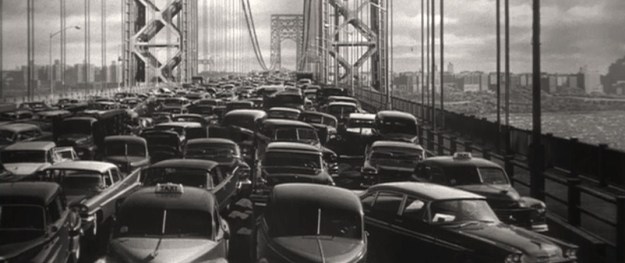There have been a lot of end-of-the-world stories – and many, many movies that told their own tale of mankind’s final days – since “The World, The Flesh and The Devil.”
Some have done it better, some have done it kickier (“Night of the Comet”), many have done it with bigger budget (“This is The End”) but only a handful – “I Am Legend,” “The Omega Man” and a couple of others – have so palpably portrayed the felling of abject loneliness as “The World, The Flesh and “The Devil.”
That’s kind of surprising, in a way, because the movie carried the added burden of tackling race relations in a very strife-torn time in this country.
Harry Belafonte, who was also a producer of the movie, plays Ralph Burton, a coal mine inspector who gets trapped in a mine cave-in. For a couple of days, he hears people digging, trying to get him out. Then the digging stops and, afraid he’s been abandoned, Ralph claws his own way out.
But when he gets out of the mine, he finds that everyone has gone. The mine site is deserted. So is the town. He finds newspapers with headlines screaming about the end of the world due to globe-girdling radioactive isotopes.
Ralph journeys from Pennsylvania to New York City, where he spends some time wandering the streets, shouting – and later shooting a gun – to try to find someone, anyone, else alive.
He doesn’t know that he’s being watched by Sarah Crandall, (Inger Stevens). Sarah watches as Ralph sets up housekeeping in an apartment, which he fills with food and supplies and populates with a couple of mannequins. He also sets up a short-wave radio and makes regular daily broadcasts, hoping to make contact with another survivor. (Eventually he does make contact with a lone voice in Europe.)
Sarah reveals herself when she cries out from the street below when Ralph tosses one of the mannequins off his balcony.
After an uneasy few moments, Ralph and Sarah become friends. But the conventions of the time – and, no doubt, the proprieties of movies – prevent anything else. Ralph is black, you see, and Sarah is white.
For months, the two go through the motions of courtship with no consummation in sight … until Sarah spots a boat coming up river. They meet the boat at the docks and find Benson Thacker (Mel Ferrer), who has tied himself in the captain’s chair. Thacker is ill and Harry nurses him back to health.
Fairly quickly, Thacker and Sarah begin the same courtship dance, but with a coupling more likely to result. Thacker, meanwhile, begins to agitate for Harry to move on and leave the “couple” alone.
By the end, Thacker is pushing Harry into a gun-toting showdown and the fate of the new world – depending on these three people – hangs in the balance.
The ending must have seemed daring for 1959, the year I was born. Today it seems like a little bit of a cop-out. Sarah doesn’t have to choose between Ralph and Benson. But there is a definite hopefulness about it, as emphasized by the final title – not “The End,” but “The Beginning.”
Although nothing but the premise is especially science-fictional, the ideas and imagery of director Ranald MacDougall’s “The World, The Flesh and The Devil” foreshadow so many later end-of-the-world films:
The three watch a movie newsreel at one point, making me think of Charlton Heston’s watching and re-watching of “Woodstock” in “The Omega Man.” And the deserted streets and radio station scenes call to mind “Night of the Comet.”




